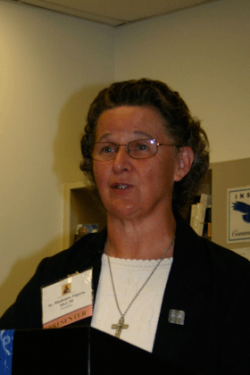We set our hope on God, His Word is for everyone

DRAPER — “The theme of this Pastoral Congress is hope,” said Sister Madonna Figura, who presented a workshop at the Annual Diocesan Pastoral Congress at the Skaggs Catholic Center Oct. 10.
Sr. Madonna, of the Congar Institute for Ministry Development run by the Oblate Fathers in San Antonio, Texas, gave a presentation on “Exploring the New Testament.” The mission of the Congar Institute is to assist dioceses in their fundamental mission of forming pastoral leaders to serve in their local churches and institutions by fostering collaborative deployment of available resources.
Sr. Madonna is a member of the Congregation of the Sisters of Saints Cyril and Methodius, founded in 1909. Their motherhouse is in Danville, Penn. The sisters live out their call and charism by witnessing to, proclaiming and building God’s Kingdom, and dedicating their prayer and ministry to: evangelization, education, elder care and ecumenism.
Saints Cyril and Methodius were Greek brothers who were born in Thessaloniki. Cyril was born in 827-828 and Methodius in 815-820. Cyril was a master theologian with a good command of both the Arabic and Hebrew languages. Both brothers became missionaries of Christianity among the Slavic people of Great Moravia and Pannonia. Through their work they influenced the cultural development of all Slavs. Cyril and Methodius devoted their lives to the love of God; to bring God’s love to the people of Pagan Slovakia.
“We never live without hope,” said Sr. Madonna. “We set our hope on the living God. It is easy for people to lose hope in our world today. The reality is we could lose hope 20 times a day by reading the newspaper, turning on the television, surfing the Internet; but God is with us. In reality, as Christian people, or Catholic Christian people, we lose hope but we find it again because of God’s grace.”
Sr. Madonna was primarily talking to catechists from parish Sunday school programs and teachers of religion in the school system. She told them as teachers they get their teacher’s guides and everything is outlined for them. But the real lesson is not how to teach a lesson, it is about touching the hearts, minds and souls of the students or people they are teaching, and making a connection of what they have heard in the Scripture no matter who is the author.
Sr. Madonna chose a Scripture passage that states what we are called to do as teachers. The scripture passage is from Nehemiah 8, and is about Ezra, a priest, who is going to bring forth the scrolls for Nehemiah to proclaim to the men, women, and children old enough to understand.
“The Word of God is for everyone,” said Sr. Madonna. “No one is too old, too young, too poor or too disabled for the Word of God. The only time people cannot hear God’s Word is when they choose not to hear it.”
Sr. Madonna spoke of the Gospel saying there is only one Gospel, that of Jesus, but it was recorded by four authors, Matthew, Mark, Luke and John. There is also the Gospel according to the Church and according to our faith life. So as teachers, if we really love God and want to share it with others, we have a deep responsibility to know it the best we can.
“When we come into a classroom, we really do not come in as teachers,” said Sr. Madonna. “Those of you who are daily school teachers are teaching many other subjects besides religion. You are teaching language arts, math and science. But when it comes time to teach religion, you are now called a catechist. There is a difference between being a teacher and being a catechist. Catechists echo God’s way. Jesus is saying something to us and using us as instruments. And we have to be sure we say it to the people the same way he intended it.”
Sr. Madonna said our religion classes are not just another class. She said they are not like math classes where some will get it and some will not, or like art where students will want to stay for an extra class. Religion classes are our faith. They are a way of life.
“It is like what happens at the end of Mass,” said Sr. Madonna. “The liturgy is over when the priest says, ‘Go in peace.’ The ritual is over, but when we go out the door, the real work is just beginning.
“We are called to teach by God,” said Sr. Madonna. “We agree to do this by our sacraments of baptism and confirmation. We sometimes do not take these sacraments seriously. But our baptismal promises are what we believe in. We say we believe in God and all his works, but we get tired and then we say we are human. But we have the grace of God through the sacraments and the virtue of hope. And when we finally step back from all the things that interfere and we still ourselves, we say, ‘I can do it.’”
Sr. Madonna said teachers are also called by the institutional church to teach, which traces all the way back to Jesus. We have a system that is ageless, and teachers are the disciples of the Church today.
© Copyright 2025 The Diocese of Salt Lake City. All rights reserved.

Stay Connected With Us